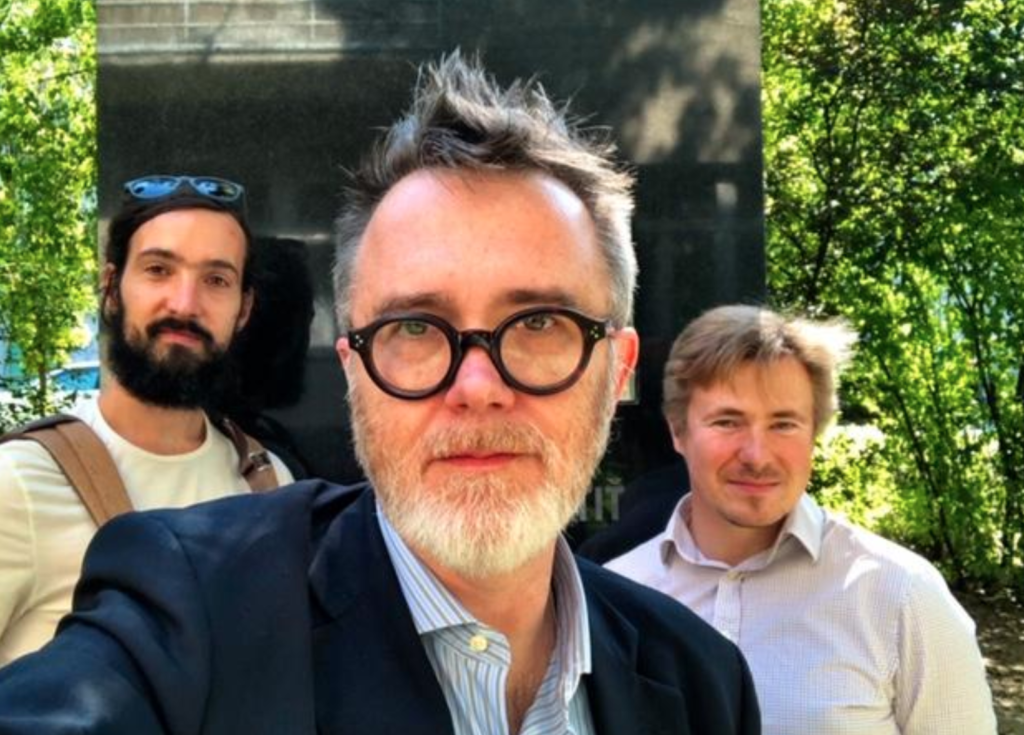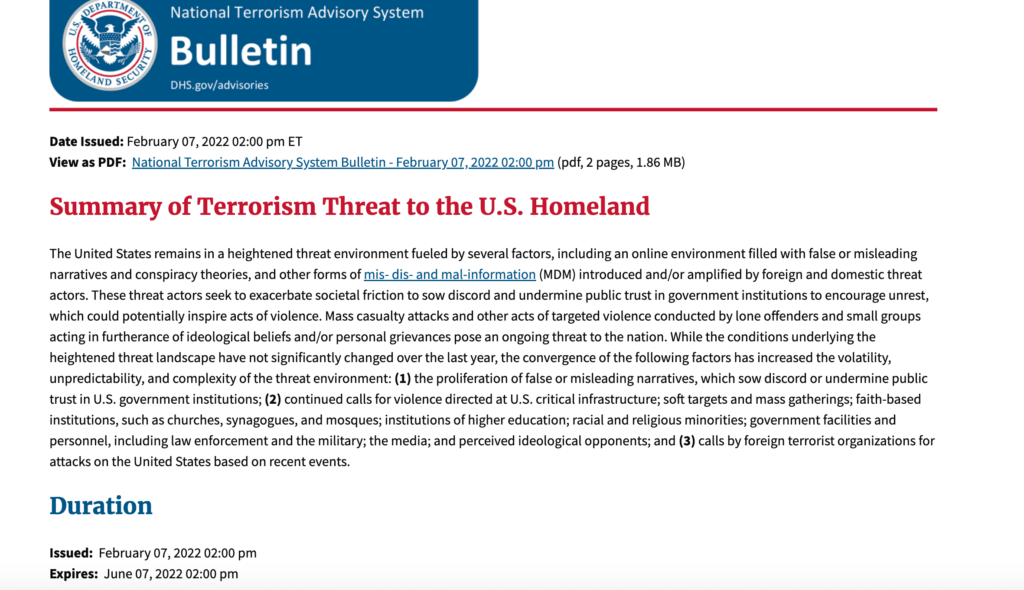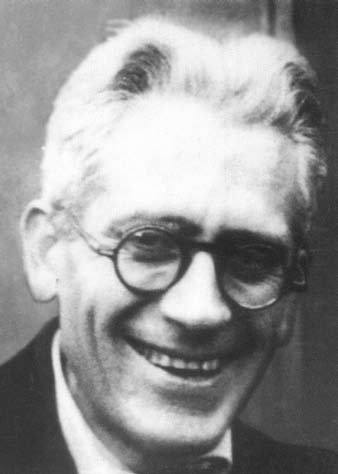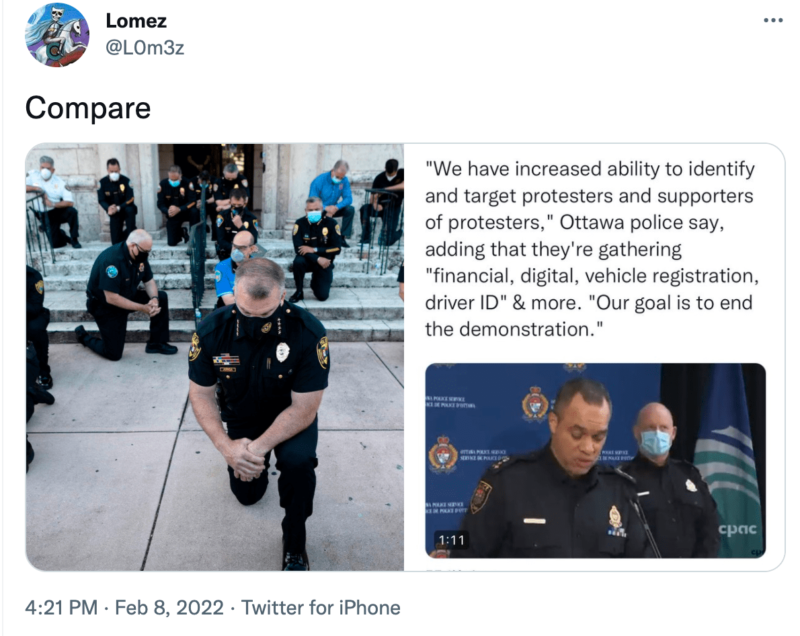Father Kolakovic & The ‘Terrorists’

You see the latest terror alert from the US Government?:

Look at number one: “the proliferation of false or misleading narratives, which sow discord or undermine public trust in US government institutions”.
Can you believe that? The US Government believes that telling “false or misleading” stories that call the public’s trust in itself into account is a precursor to terrorism. Do you see where this is going? Do you?
Good timing, then, that Crisis magazine published this week this must-read essay about Father Tomislav Kolakovic, the heroic and mysterious Catholic priest to whom I dedicated Live Not By Lies. The Croatian author of the piece, Matija Štahan, refers to the priest in his essay as “Poglajen,” which was Father Kolakovic’s given name (he changed it to Kolakovic, his mother’s maiden name, to conceal his identity from the Nazis when he fled Zagreb). Štahan writes:
As an unusual personality who had a multitude of pseudonyms in the second half of his life, Poglajen is a member of several traditions. The first of these is the tradition that Christ described anticlimactically as prophets who were not recognized in their own homeland. Poglajen is forgotten in Croatia today, and it would not be surprising if, thanks to Dreherʼs work, he is better known in the English-speaking area than here in Croatia. Another tradition to which Poglajen belongs is that of Croatian Catholic idealists and, many would say, blinded romantics.
What a small shock it was to learn that Father Kolakovic (he will always be that to me, sorry) is unknown in his homeland! I hope I can do something about that. More:
But the part of Poglajenʼs life that served as the inspiration for Dreherʼs book also provides material for raising awareness of the third tradition to which Poglajen belonged. This tradition consists of a small number of people with a double gift—both a prophetic and practical one: the gift of evangelization.
The best example of this practical aspect is perhaps St. Benedict, to whom Dreher dedicated his previous book, The Benedict Option. Just as a medieval saint established monasteries that preserved Christian cultural and spiritual heritage from the devastation of barbarian hordes that besieged Europe, so Poglajen, under the pseudonym Kolaković, on the eve of the Soviet invasion of Slovakia, established the Family, a secret community of believers dedicated to preserving the Catholic truth. The chain reaction in which the members of the Family played a significant role would lead to the death of the communist dictatorship in Czechoslovakia a few decades later.
Poglajen demonstrated the visionary aspect of his personality on the eve of the Second World War, writing essays on the dangers and deep similarities of all totalitarianisms. “If two men begin to destroy the whole of Christian culture from two very distant starting points, there must necessarily come a time when they will meet on the ruins of a devastated sanctuary,” he wrote in 1939, after the Molotov-Ribbentrop Pact between the Third Reich and the Soviet Union. Essays containing sentences such as “One Stalin hid in Adolf Hitler and one Adolf Hitler hid in Stalin” afforded him only one accolade—his name appeared on the Gestapoʼs blacklist. After the new Croatian state was formed in 1941 in alliance with Germany and Italy, Poglajen changed his name for security reasons and set out to roam the world for almost half a century.
What Dreher is trying to show today is that social tendencies in the West hide totalitarian potential. Correctly referring to several authors ranging from Aleksandr Solzhenitsyn to Hannah Arendt, his view of todayʼs “soft totalitarianism” is worth supplementing with a few remarks. For example, almost all aspects of the totalitarianism that prevailed in the Third Reich and the Soviet Union reappear in the West today. Totalitarianism is not a feature of the Left or the Right, but it is a transideological phenomenon that can haunt liberalism, just as it possesed fascism and communism in the 20th century. Totalitarianism is not the ideology but the spirit which haunts ideologies.
Štahan goes on in this remarkable short piece to talk about the situation in the former Yugoslavia, of which Kolakovic’s native Croatia was a part, and how the totalitarian evil in that Communist country was harder to see because Yugoslavia under Tito was comparatively more liberal than other Eastern bloc regimes. Štahan analogizes this to the West today, saying that we don’t perceive the totalitarian nature of what’s happening in our own societies because it is not (yet!) so sharp, and because we are distracted by material bounty and pleasures.
Just as the core of the Yugoslav regime was hidden by cheap concessions to the people, that is also the case with the ideology of progressivity in the modern West. Today, our passive fellow citizens are not bought with a crumb of freedom but with popular culture, narcotics, and sexual apps. In communist Yugoslavia, where “socialism with a human face” ruled, unlike Czechoslovakia, there were no secret cells of Catholic believers. Luckily, the role of the main enemy of the regime was taken over by the Catholic Church.
But what when the institutional Church fails; moreover, when its influence, as today, vanishes? Then the only resistance can be offered by the laity. Poglajen was aware of that. Let us not allow the new totalitarianism with a “human face” to deceive us again.
Please read the whole Crisis essay and share it widely.

Štahan sees quite clearly the lesson of his clerical countryman’s life: we cannot afford to be deceived, but have to read the signs of the times and, as the laity, prepare for resistance, placing no confidence in the institutional church. Remember, as I write in Live Not By Lies, the Slovak bishops did not believe Father Kolakovic when he arrived in their country as a refugee from the Nazis in 1943, and began preaching that after the Germans were defeated, the Soviets were going to be left ruling their country, and that the first thing the Communists were going to do would be to persecute the Church. The bishops were complacent, and believed that such a thing could not happen in their country. Father Kolakovic (pron. “ko-LAH-ko-vich”) knew different. From Live Not By Lies:
Father Kolaković knew that the clericalism and passivity of traditional Slovak Catholicism would be no match for communism. For one thing, he correctly foresaw that the communists would try to control the church by subduing the clergy. For another, he understood that the spiritual trials awaiting believers under communism would put them to an extreme test. The charismatic pastor preached that only a total life commitment to Christ would enable them to withstand the coming trial.
“Give yourself totally to Christ, throw all your worries and desires on him, for he has a wide back, and you will witness miracles,” the priest said, in the recollection of one disciple.
Giving oneself totally to Christ was not an abstraction or a pious thought. It needed to be concrete, and it needed to be communal. The total destruction of the First World War opened the eyes of younger Catholics to the need for a new evangelization. A Belgian priest named Joseph Cardijn, whose father had been killed in a mining accident, started a lay movement to do this among the working class. These were the Young Christian Workers, called “Jocists” after the initials of their name in French. Inspired by the Jocist example, Father Kolaković adapted it to the needs of the Catholic Church in German-occupied Slovakia. He established cells of faithful young Catholics who came together for prayer, study, and fellowship.
The refugee priest taught the young Slovak believers that every person must be accountable to God for his actions. Freedom is responsibility, he stressed; it is a means to live within the truth. The motto of the Jocists became the motto for what Father Kolaković called his “Family”: “See. Judge. Act.” See meant to be awake to realities around you. Judge was a command to discern soberly the meaning of those realities in light of what you know to be true, especially from the teachings of the Christian faith. After you reach a conclusion, then you are to act to resist evil.
Václav Vaško, a Kolaković follower, recalled late in his life that Father Kolaković’s ministry excited so many young Catholics because it energized the laity and gave them a sense of leadership responsibility.
“It is remarkable how Kolaković almost instantly succeeded in creating a community of trust and mutual friendship from a diverse grouping of people (priests, religious and lay people of different ages, education, or spiritual maturity),” Vaško wrote.
The Family groups came together at first for Bible study and prayer, but soon began listening to Father Kolaković lecture on philosophy, sociology, and intellectual topics. Father Kolaković also trained his young followers in how to work secretly, and to withstand the interrogation that he said would surely come.
The Family expanded its small groups quickly across the nation. “By the end of the school year 1944,” Vaško said, “it would have been difficult to find a faculty or secondary school in Bratislava or larger cities where our circles did not operate.”
In 1946, Czech authorities deported the activist priest. Two years later, communists seized total power, just as Father Kolaković had predicted. Within several years, almost all of the Family had been imprisoned and the Czechoslovak institutional church brutalized into submission. But when the Family members emerged from prison in the 1960s, they began to do as their spiritual father had taught them. Father Kolaković’s top two lieutenants—physician Silvester Krčméry and priest Vladimír Jukl—quietly set up Christian circles around the country and began to build the underground church.
The underground church, led by the visionary cleric’s spiritual children and grandchildren, became the principle means of anti-communist dissent for the next forty years. It was they who organized a mass 1988 public demonstration in Bratislava, the Slovak capital, demanding religious liberty. The Candle Demonstration was the first major protest against the state. It kicked off the Velvet Revolution, which brought down the communist regime a year later. Though Slovak Christians were among the most persecuted in the Soviet Bloc, the Catholic Church there thrived in resistance because one man saw what was coming and prepared his people.
We need to hear the Croatian priest’s prophetic and evangelical voice today! We need not only to hear it, but to act on it. You have to be willfully blind not to see what’s happening in America (and not just America, but the West). You can be like the complacent Slovak bishops, or you can be like Father K. and his followers, who were not willing to sit back and hope for the best. This short passage above, from Live Not By Lies, shows you how to get started. You don’t have to have an elaborate plan for a clandestine network and all that; you just need to start a group in your church or community, dedicated to applying the See-Judge-Act method to analyzing the situation as it develops, and coming up with clear plans of action.
A key thing: do not wait on church authorities to take the lead. It is not likely to happen. Many of them have powerful incentives to believe in the status quo, to not rock the boat, and so forth. They want to think that they have more control than they do. Maybe they want to believe that all will be well if we just sit back and wait, and trust God to sort things out. Well, look, I believe that God sent into the midst of the Slovak church a prophet, Father Kolakovic, to wake the church up and prepare it for persecution! But the leaders of the church did not recognize him. So it goes. But there were others — priests like Father Jukl, and laymen like Dr. Krcmery — who did see, hear, and follow Father Kolakovic. It is because they did that the Slovak underground church survived Communist persecution.
We in the contemporary American church might not be facing something so harsh. I hope and pray not. But the signs do not look good. As you know, I wrote Live Not By Lies because I kept hearing from people who had escaped Communism by emigrating to the West that they were seeing things happen here that reminded them of what they left behind. I was finally convinced that God was using them prophetically, to wake us up. I learned about Father K. on my first trip abroad researching the book. He died in 1990, but Father K. is still preaching prophetically to us today.
Maybe his spiritual grandchildren are wrong, and the totalitarian trial will pass us by. Yesterday in Budapest, I had coffee with a friend from western Europe, who said that he is encouraged by things, like Gov. Youngkin’s victory in Virginia, that indicate wokeness might be waning. I disagree. I hope he’s right, but this malignant ideology is deeply entrenched in the US elite and in elite institutions, and won’t be cast out by a single election. And, the younger generations are much more accepting of it. I certainly intend to vote against wokeness, and to support actions to roll it back. We should not, though, assume that we will win, simply because It Can’t Happen Here.
And you should know this, and know it well: by the time the true face of the enemy shows itself, it will be too late to prepare.
We have now the gift of time, and liberty. In the US, our government is now talking about how telling stories that reduce people’s trust in it — like, maybe yesterday’s account of a morally lawless California court stripping a divorced man of custody of his child and handing the boy over to his mother for chemical castration and perhaps later sexual mutilation — is a precursor to terrorism. Or compare the response of Canadian police to the working-class truckers’ protest to the way PM Justin Trudeau and Canadian police took a knee in reaction to the various Black Lives Matter protests, some of which burned down city blocks, sacked businesses, and the like. In Canada, if you give food to protesting truckers, you could be arrested and charged:

Don’t you see what’s happening? What’s it going to take? What if Father Kolakovic showed up in your church community today, warning about persecution to come, and the need to prepare for it? How would you receive him? Would you receive him at all?
The little old man — he’s under five feet tall — simply sounded his minivan’s horn to show he was on the side of truckers. They cuffed him. Watch it for yourself.